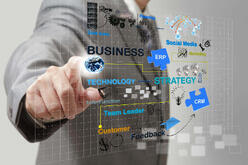 An ERP system is a lot like the old story about the elephant and the blind men. Each of the men perceived the elephant as very different, depending on which part of the elephant they touched.
An ERP system is a lot like the old story about the elephant and the blind men. Each of the men perceived the elephant as very different, depending on which part of the elephant they touched.
With an ERP system, one person's perception of the system is greatly colored by the aspects they touch. To someone else at the company, ERP may look and feel totally different. In reality, an ERP system is much more even than the sum of its parts. Here's a quick rundown on what it does.
So what exactly does an ERP System do?
Transaction repository
Most people realize that their ERP system processes business transactions such as inventory receipts and withdrawals, providing an accurate picture of what’s on hand and on order. It translates these transactions and on-hand balances to financial records—reflecting income and costs to generate financial reports.
Production scheduling
ERP systems are repositories for information about the company’s products and processes as well. The ERP system typically holds a bill of material, or BOM, that lists all the items that make a product or sub-assembly. They also include information about the plant and equipment available, and the specific steps that are necessary to create a finished item.
With this information, the ERP system calculates a production schedule that optimizes efficiency while minimizing inventory and realizing the greatest revenue and customer satisfaction.
Demand and supply balancing
ERP systems typically have a forecast of projected orders, and through a process called an MRP explosion or generation, the system calculates the quantities of specific items that must be purchased or manufactured in order to meet the projected demand. It’s easy to do this if you just order everything to come in on the first day, but MRP is smart enough to minimize the inventory investment by staggering (known as time-phasing) the requirements to minimize cash and space requirements, as well as reducing spoilage and obsolescence.
Manages procurement
ERP makes recommendations about materials to purchase, the supplier to purchase them from, and the quantities and dates that are necessary to meet the plan. ERP even keeps track of the planned cost of an item, called the standard cost, and calculates a purchase price variance when the price paid deviates from the standard.
Cost accounting
Purchase cost and purchase price variance are only small parts of the elaborate cost accounting capabilities most ERP systems provide. They keep track of cost elements such as material, labor and overhead, and may track variances such as scrap and yield.
Creates quotes and sales orders
It doesn’t help to manufacture product if you can’t sell it, and ERP systems create sales orders and quotations for customer orders. They also calculate revenue and margin on orders.
Manages shipments
Picking and packing orders in the warehouse and adding freight or handling charges helps to keep inventory accurate, satisfy customers and capture additional costs.
Generates invoices
Processing a shipment to a customer generates an invoice, which results in revenue for the company. If the revenue general exceeds costs, there is a profit.
Collects cash
Accounts receivable is where ERP records cash collections against invoices, ensuring that the company receives payment for its hard work and excellent products.
Generates financial reports
Most companies are required to report financial results periodically, and the ERP system gathers all the information from the various transactions and summarizes them into standard financial formats such as balance sheets and income statements.
Supports decisions
By making information readily available and actionable, ERP helps employees make good decisions quickly, based on facts rather than guesswork. Fact-based decisions usually achieve better results and greatly contribute to the overall health of the business.
Measures progress toward strategic goals
Every company has strategic goals and ERP has a plethora of facts and information that help to measure progress toward those goals.





